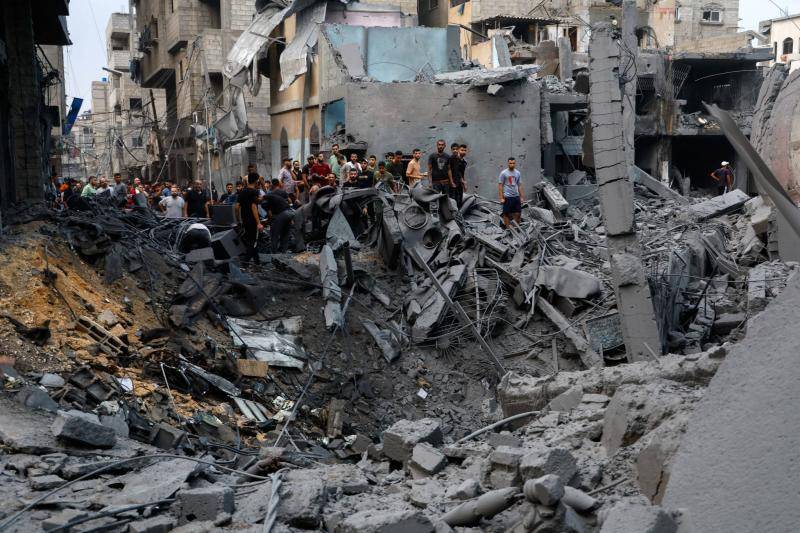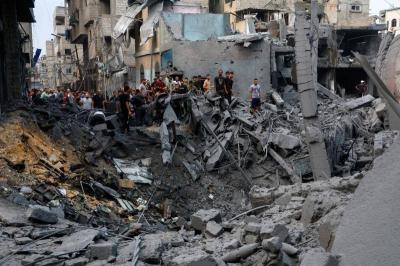On Tuesday, ceasefire talks hosted in Cairo between the Palestinian Islamic Resistance Movement (Hamas) and mediators collapsed, as only a few days remain to halt fighting before Ramadan begins. Senior Hamas leader Basem Naeem told Reuters that the movement presented its proposal for a ceasefire agreement to the mediators over two days of negotiations and is now awaiting a response from the Israelis, who were absent from this round. Naeem added that Israeli Prime Minister Benjamin Netanyahu "does not want an agreement, and the ball is in the American court to pressure him towards reaching an agreement."
Israel has refrained from publicly commenting on the Cairo talks. A source previously informed Reuters that Israel boycotted the discussions because Hamas rejected its request to provide a list of all hostages still alive. Naeem explained that this is impossible without a ceasefire first, given that the hostages are distributed across the war zone and held by various factions.
There were hopes that the Cairo talks would be the final step before achieving the first long-term ceasefire in the conflict, a 40-day truce during which dozens of hostages would be released, and aid would be sent to Gaza to prevent a famine ahead of Ramadan. Egyptian security sources said on Monday that they were still in contact with the Israelis, allowing negotiations to proceed without an Israeli delegation.
The United States, Israel's closest ally and one of the sponsors of the ceasefire talks, stated that a deal accepted by Israel is already on the table and that it is up to Hamas to accept it. Hamas rejects these statements, viewing them as an attempt to shift blame onto Israel if the talks collapse without an agreement. The U.S. is also urging Israel to take further steps to alleviate the humanitarian catastrophe in Gaza, where over 30,000 people have died in the Israeli strike ignited by a cross-border attack by Hamas on October 7, which Israel claims resulted in the deaths of 1,200 people.
### Hunger Looms in Gaza Strip
Hunger currently dominates the besieged Gaza Strip, where aid supplies have drastically diminished over the past month after already sharply declining since the onset of the war. Entire areas of the strip have now been completely deprived of food. The few hospitals still operating in Gaza, already overwhelmed with war injuries, are now filled with children starving to death.
Child Ahmed Kanaan lies on a bed at Al-Awda Hospital in Rafah, his eyes sunken and his face pale, draped in a yellow jacket. The child has lost half his weight since the war began and now weighs only six kilograms. His aunt, Israa Kalakh, told Reuters, "His condition is getting worse. God help us with what is to come." A nurse stated that these emaciated children are now flooding into the hospital in unprecedented numbers, adding, "We are facing a large number of patients suffering from this issue of malnutrition."
The situation in northern Gaza is the worst, as relief agencies and media cameras cannot access it. Health authorities in Gaza report that 15 children have died from malnutrition or dehydration in one hospital. The World Health Organization reported on Tuesday that malnutrition is "especially exacerbated" in the northern sector. Richard Peeperkorn, the organization's representative in Gaza and the West Bank, noted that one in every six children under two years old suffers from acute malnutrition there.
Israel claims it is prepared to allow more aid into Gaza through the two checkpoints it has opened at the southern edge of the strip, blaming the United Nations and other relief agencies for not distributing aid more broadly. Relief organizations state that this has become impossible amid the breakdown of law and order, and that allowing food entry and securing its distribution lies with Israel, which has invaded and patrols Gaza towns. Adel Khodor, the regional director of UNICEF in the Middle East and North Africa, stated, "The sense of helplessness and despair among parents and doctors, who realize that life-saving aid is being withheld just a few kilometers away, must be unbearable."




